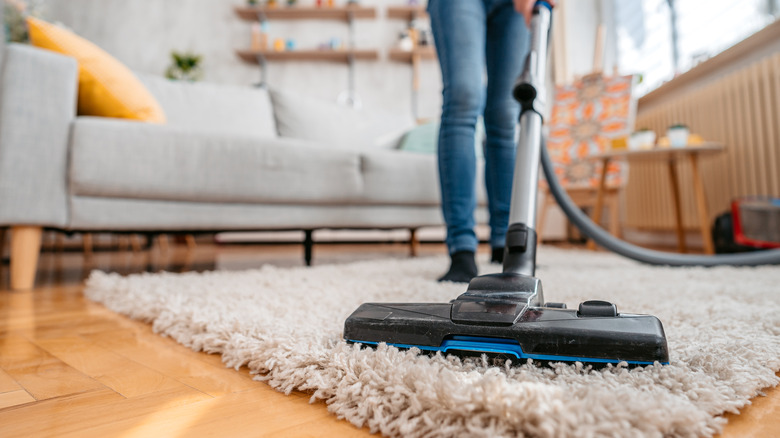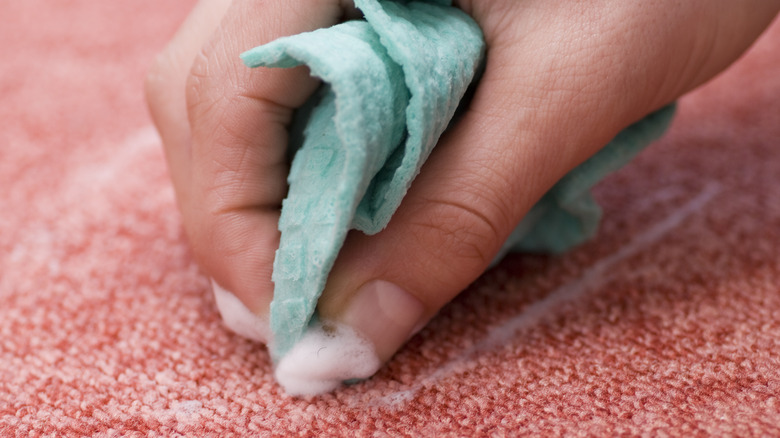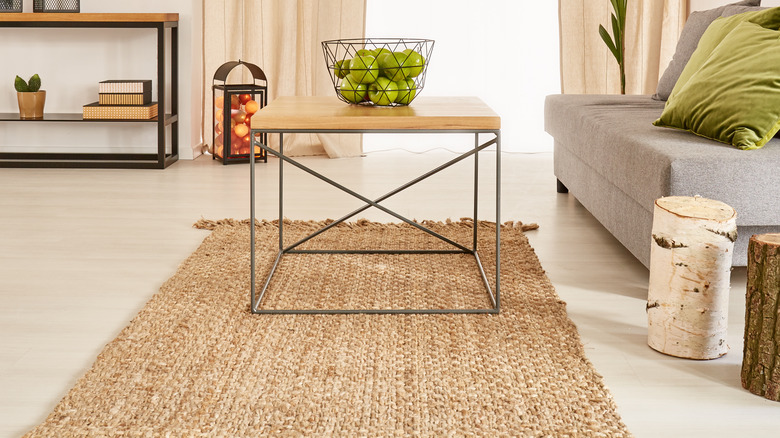Two Methods When It Comes To Removing Rust From Carpet
You're happily going about your day at home. Then you move a piece of furniture or stumble upon a forgotten corner, and there it is — the dreaded rust stain on your carpet, seemingly mocking your commitment to maintaining a pristine home. But luckily, you've got not one but two remedies to help you banish that unsightly blemish. The first method incorporates the dynamic duo of salt and lemon juice. And when that doesn't cut it? You can always fall back on plan B, a more elaborate exercise requiring a butter knife, dish soap, a sponge, ammonia, salt, lemon juice, white vinegar, and extra elbow grease.
Mastering how to get rust stains out of a carpet is commendable. But that alone is like slapping a band-aid on a wound that keeps reopening. To truly conquer this rusty foe, you must first understand its origin. The most obvious culprits are pieces of furniture with metallic legs. But don't be fooled, for there are other sneaky sources of rust, such as metal pipes hiding in plain sight, biding their time to tarnish your carpet. Some measures to keep the rust away from your rug include using plastic caps or furniture coasters for carpets and keeping an eye on rogue metal objects. You also want to embrace the power of humidity control. With this knowledge, go forth and conquer those stubborn stains with the confidence of a seasoned rust crusader.
How to remove rust from your carpet
The first remedy requires two humble kitchen ingredients; salt and lemon juice. The acidic nature of lemon juice helps break down the rust, while the abrasive properties of salt aid in lifting the stain from the carpet fibers. Begin by making a paste of salt and lemon juice. Rub it on the rust stains on your rug and let the two superheroes work their magic for a few minutes before introducing the grand finale: hot water. Pour it directly onto the affected section to flush away the remnants of the stain. So, if you've been wondering how to get rust out of a carpet with lemon juice, that's it.
As for how to eliminate rust from a carpet with vinegar, start by gently loosening the rust particles using a butter knife. Exercise caution to avoid ripping the fibers off your precious carpet. Next, dab the affected area with a sponge dampened with dish soap and, finally, with a white towel. Should the stain be remarkably stubborn, dose it with a solution prepared from two cups of water and one tablespoon of domestic ammonia. If unsuccessful, unleash the formidable lemon juice, salt, and white vinegar on the affected portion. Let the concoction dissolve the rust for a few hours, then gently dab it with a moistened cloth. At this point, your carpet should be spotless and ready to impress your guests again.
Causes of rust stains on carpets and prevention tips
Rust results from a chemical reaction known as oxidation, which occurs when iron or its alloys come into contact with oxygen and moisture. Picture a disastrous love triangle featuring iron, oxygen, and humidity entangled in a rusty mess. But how does this rusty romance find its way onto carpets? The primary suspects are steel-studded furniture, such as sofas, chairs, and tables. Metallic studs, acting as secret agents for rust, can corrode over time, especially in humid environments, and transfer rust stains onto the carpet fibers beneath. Similarly, lamp stands, pipes, and other metal objects touching the carpet are potential accomplices.
Several proactive measures can save your carpet from rust stains. One is to swap the steel studs on your furniture with plastic furniture caps available at hardware stores. These plastic caps are a barrier between the metal and your carpet, ensuring rust doesn't stand a chance. It's like putting your furniture on a rust-free diet — your carpet will be forever grateful. Another preventive measure is to distance steel stands and other metal objects from your carpet. It may seem like a no-brainer, but it's surprising how many people let their rugs snuggle up to metal objects, oblivious to the potential rust-stained heartbreak. Lastly, maintaining a healthy moisture level can help. For this, a dehumidifier will suffice.


